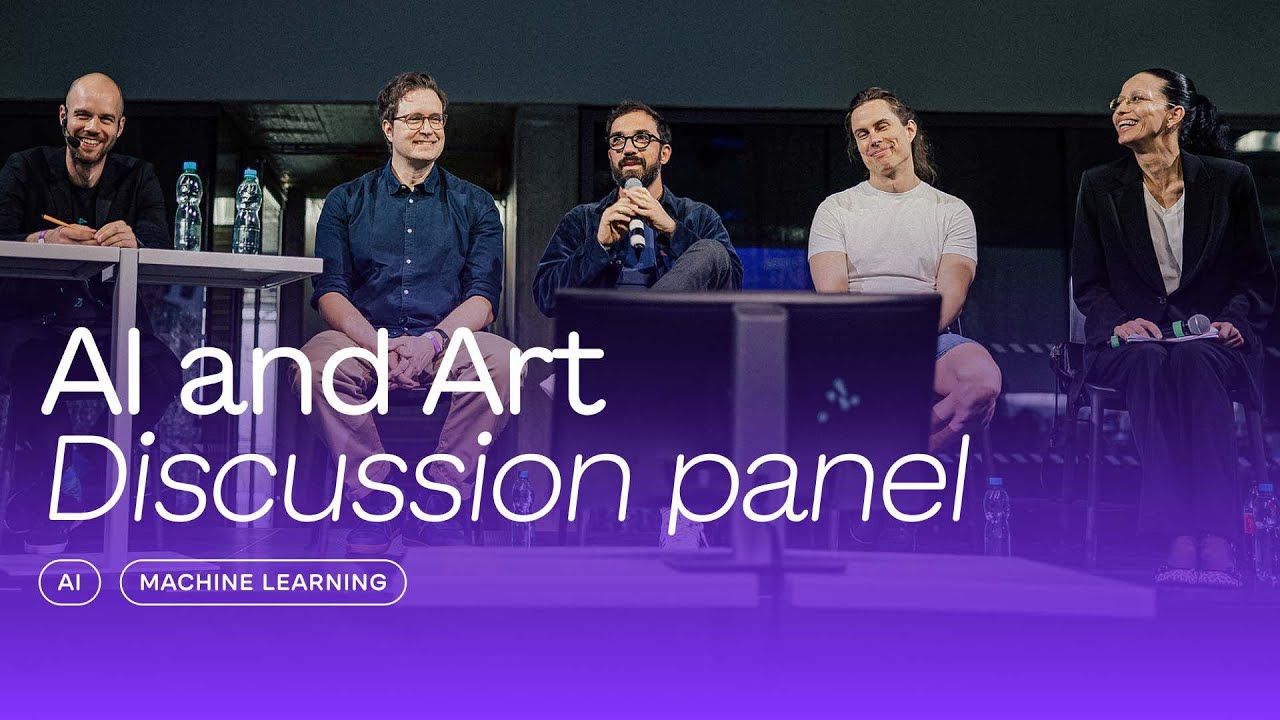Thoughts on Artificial Intelligence
Photo: Vyběr Socky
What a ride! I’m sitting in the room of a luxury hotel in Prague, once again packing this suitcase that I’ve been living out of for just under three and a half months. It’s the last day of a long trip with stops in Barcelona, Stuttgart and now Prague. Today I’m heading back home.
Rewind: It’s 2 p.m. on the second day of Mouvo – a Prague-based conference on digital art. I’m sitting on an expansive stage. Next to me are four other panelists in person, with three others connected online. In front of us, several hundred people are eagerly awaiting our conversation, which is supposed to revolve around artificial intelligence and art.
The panel starts promisingly. The moderator is ambivalent and sees himself somewhere between enthusiasm and concern when it comes to AI. I feel for him. The rest of the discussion focuses on the impact that artificial intelligence will have on the creative industry: It’s about copyright infringement, changing the art and design profession – the big picture is deliberately left out for now. I listen with interest, but the more specific the discussion gets, the bigger the questions in my head become. I think about ethics, about the consequences for higher-level systems and ask the speakers around me what they think about these topics. Their enthusiasm for the new possibilities is at the forefront of their minds.
Is Silicon Valley afraid of itself?
Anyone who has followed the media in recent months has not been able to avoid the topic of AI. Probably the biggest surprise: part of the American tech elite – including technology ethicists like Jaron Lanier, Tristan Harris, Aza Raskin or Yuval Noah Harari, as well as entrepreneurs and engineers like Elon Musk and Geoffrey Hinton – warn against the unpredictability of implementing AI too quickly and call for a temporary development stop.
A digital art conference is not the place to discuss these major developments. That would rightly go beyond the scope of the event. But inspired by the exciting exchange in front of and behind the stage of Mouvo, I would like to take advantage of the momentum and venture a look at the macro level.
Move fast and break things?
Underpinned by the advance of digitization, the last 30 years have been a technological roller coaster ride: unimaginable innovations have changed our lives on many levels. Some of them have overshot the mark by a wide margin and with serious consequences.
In the beginning, there was a promise: Tim Berners-Lee, now known as the inventor of the World Wide Web, laid the foundation in the mid-1980s for a technology that entered the world with the vision of connecting people and making the world’s knowledge freely available. Today, Berners-Lee stands on stages around the world and sums up that the Web has become “an engine of injustice and division; influenced by powerful forces that use it for their own purposes.”
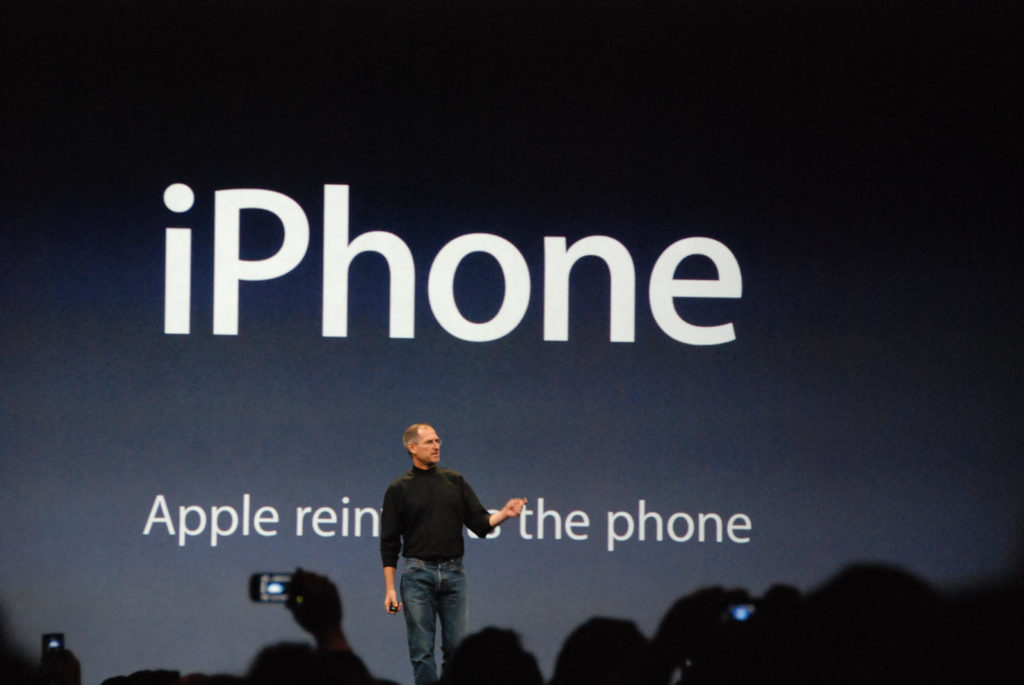
Another example: In 2007, Steve Jobs introduced the iPhone to the world. As a combination of iPod, Internet navigator and phone, it is supposed to make our lives easier. Another great idea! Today, we see that the operators of social media apps, for example, have the ability to observe and influence our behavior via our cell phones and deliberately get us addicted to their applications. But what do we learn from this?
Macro-Cosmos, Micro-Discussion
Often I think that – had we progressed a bit more reflectively and slowly – we could benefit far more from the “good sides” of technological change today. It feels like there has always been too little time to adequately reflect on supposed innovations and think about what consequences novel technologies might actually have for people, society and the environment.
Technology is the answer. But what is the question?
Cedric Price
Of course, I also find AI exciting and quite helpful. For years, for example, I have been using DeepL to translate texts. For me, it’s not about dogmatic rejection of supposed technological progress, but about a healthy mix of curiosity and skepticism, which I miss in the current discussion in Europe. And about remembering that technology is not the solution to everything… .
Cycling to Paris
Throwback: At the age of 18, I’m sitting on a park bench in Amsterdam on a freezing New Year’s Eve. My travel budget is long overdrawn and I have no choice but to wait for the bus that is supposed to take me back home in a few hours.
Trembling and somehow uncertain, I look into the distance. It’s one of those typical turning points in life, but I just don’t know where to go. Overwhelmed by the possibilities and duties of the upcoming adult life, I make a decision on the spot: “Before I leave, I’ll ride my bike to Paris.”
Shortly thereafter, I buy all the books on bicycle travel I can find. I read about people who cycle around the world with their own muscle power and am fascinated by the insights that slowness and reduction give them. In the summer before I start my job, I cycle alone to Paris and realize that it doesn’t take much more to live than fits in two bicycle bags.
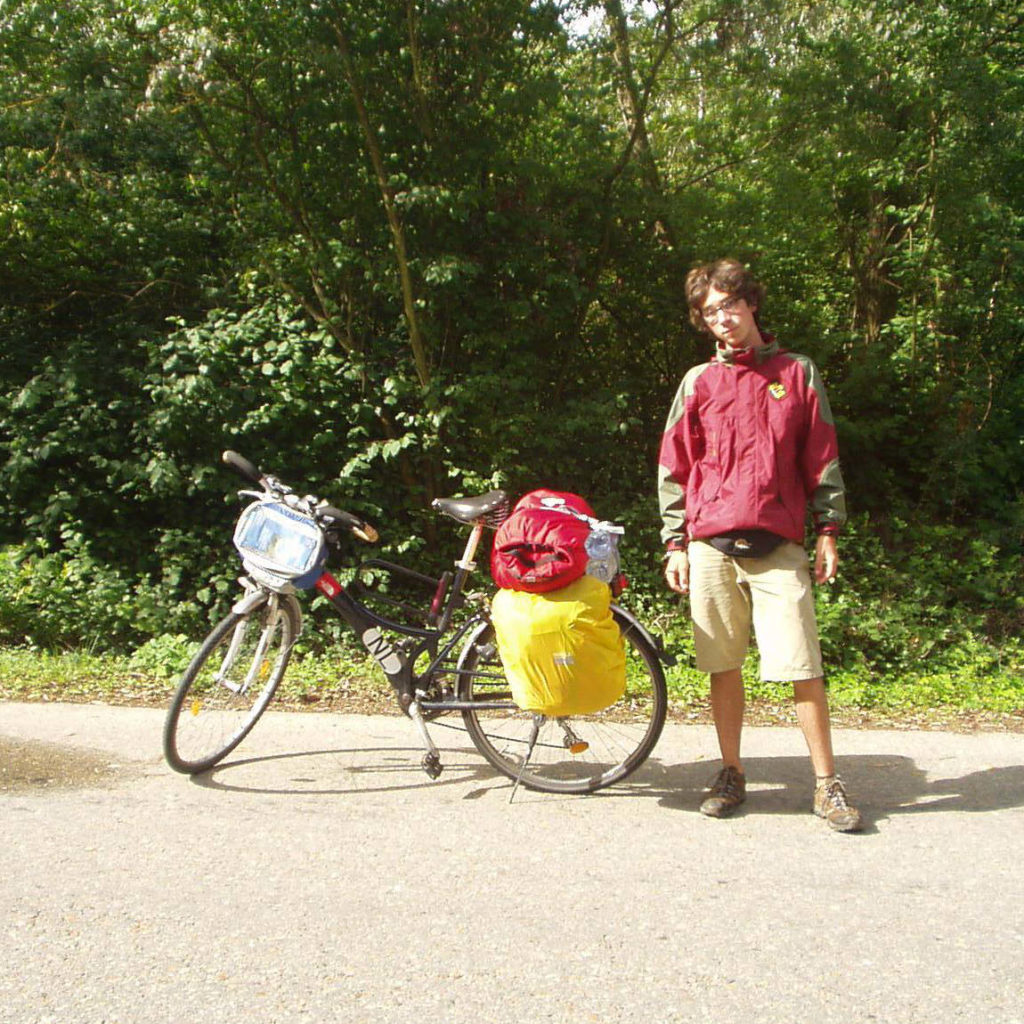
Back to basics?
The experiences I had during my journey laid the foundation for two principles that still influence my projects and decisions today: considered reduction and deliberate slowness.
My enthusiasm for the topic of low-tech stems precisely from these learnings. The movement is about breaking away from technology as soon as it becomes more of a burden than a support. Always a real creativity boost for me! Because in a super complex, interdependent world, it’s helpful to regularly free yourself from dependencies and things you don’t need. Whether it’s life or technology, it’s good to just slow down – especially in moments of upheaval that are crucial for future development. Like on my trip to Paris.
Remember your roots
In the panel on AI, another participant addressed me about an Instagram post I had published a few weeks earlier. It was about the sentence: “Creative Coding with ChatGPT is like asking a stranger to chew your food.”
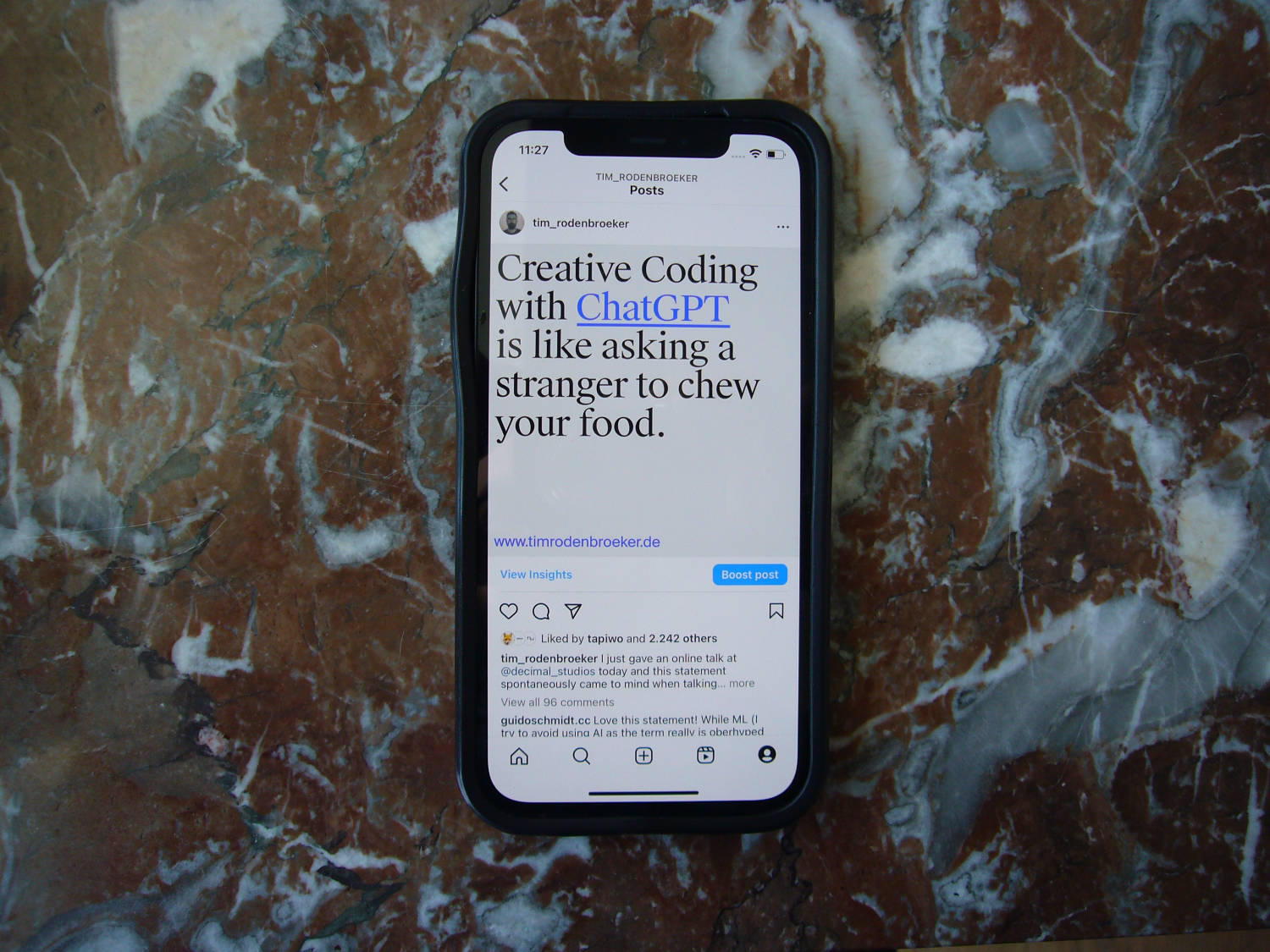
He asked me why I was skeptical about the use of AI and showed me a piece of work he had generated using ChatGPT. I tried to explain my point of view: If one considers AI as a tool to achieve certain results in Creative Coding, this is – as he had impressively demonstrated – perfectly possible and in my eyes absolutely legitimate. But creative coding is not exclusively about results.
(Creative Coding) is a process, based on exploration, iteration, reflection and discovery, where code is used as the primary medium to create a wide range of media artifacts.
Mark Mitchell, Oliver C. Bown: Towards a Creativity Support Tool in Processing. Understanding the Needs of Creative Coders. ACM Press 2013, page 143–146, cited according to: Stig Møller Hansen: public class Graphic_Design implements Code {//Yes, but how?}: an investigation towards bespoke Creative Coding programming courses in graphic design education, Aarhus 2019, page 13. Link
For me, Creative Coding is not just a way to create graphics and animations, but a thinking tool that makes the hidden structures of the computer tangible. It is process, flow experience, and artistic method all in one, making clear not only that code is the material on which our digitized present is built, but that it simultaneously empowers us to help shape it.
If you use artificial intelligence in creative coding right from the start without ever actually coding yourself, you will miss out on experience that will influence the cognitive process and thus also later results. If one is again guided by the low-tech idea, it would be more expedient to use ChatGPT when one either knows exactly what needs to be done and wants to save time or is faced with hurdles that one cannot overcome on one’s own. This way, you solve a problem that you wouldn’t be able to handle yourself (yet) with the support of the AI, and at the same time you don’t get too far away from the actual act of coding, so you can continue to enjoy the creative process.
Wrapping up
After more than three months on the road, I’m back in Paderborn at my computer. Happy and still reeling from the experiences of my tour, I feel a bit like I do after returning home from Paris. Slowly, the many new impulses that the last months have left behind are settling and finding their way into new ideas and thoughts that I share with my community, sometimes with code, sometimes with words.
One thing is clear: Artificial intelligence will play an important role in creative coding in the future. But used without prior knowledge, the supposedly helpful technology can quickly become a dead end that comes in the guise of a shortcut. Critical thinking and independent trial and error combined with the courage to slow down and look at the big picture have always been the keys to insight and creativity for me. In times of internet bullshit, clickbait and FOMO, these principles seem more important to me than ever.
In the end, my goal is to spark discussions and stay in dialogue. I’m very fortunate to keep meeting people in the Creative Coding community who are reflective, critical, and courageous in tackling new topics. The pace of technological change continues to worry me, but with an inkling of where the greatest potentials are hiding for me, it has made me want to explore the unexplored territories that are just opening up at the intersection of Creative Coding and AI. Are you in?
Related links
Credits
- Larissa Lenze (editing)
- Photography AI panel: Vyběr Socky
Related
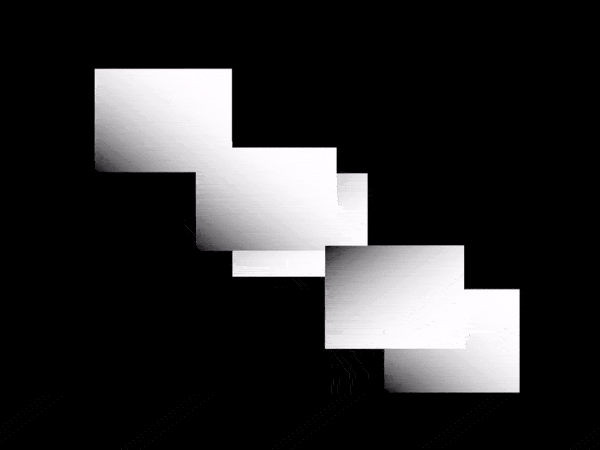 A Call for Coding Designers
A Call for Coding Designers
This is a call for coding designers. It aims to serve as a proposal and a provocation for creative work […]
 A reflection on Processing Community Day Copenhagen 2023
A reflection on Processing Community Day Copenhagen 2023
I’ve been travelling a lot in the last few months. Still, it was only during a short stay in Copenhagen […]
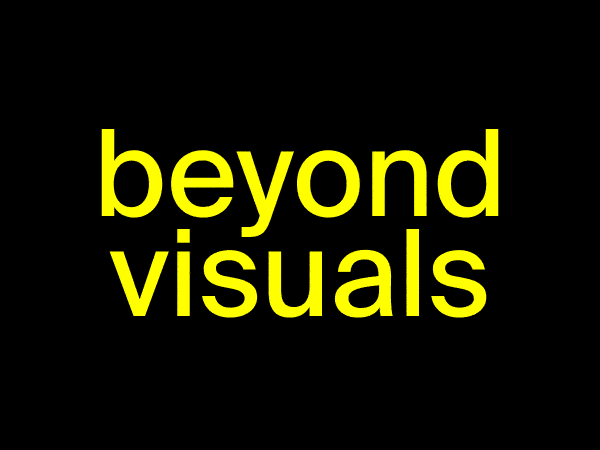 What Creative Coding can teach you beyond crafting visuals
What Creative Coding can teach you beyond crafting visuals
Learning to code has had a bad reputation for ages. Many people have the impression that it’s all about acquiring […]
 How I built myself a Digital Garden
How I built myself a Digital Garden
It was a red hot day in July 2023 when I met Alex Muñoz for breakfast in the morning at […]
 Digital Impact @ Disseny Hub
Digital Impact @ Disseny Hub
A few days ago, I visited the Disseny Hub in Barcelona to see the exhibition “Digital Impact”. On the website, […]
 Demystify Technology – A kind of Manifesto
Demystify Technology – A kind of Manifesto
A Fortunate Look into the Spam Folder When I opened my email program on an ordinary workday in the morning […]
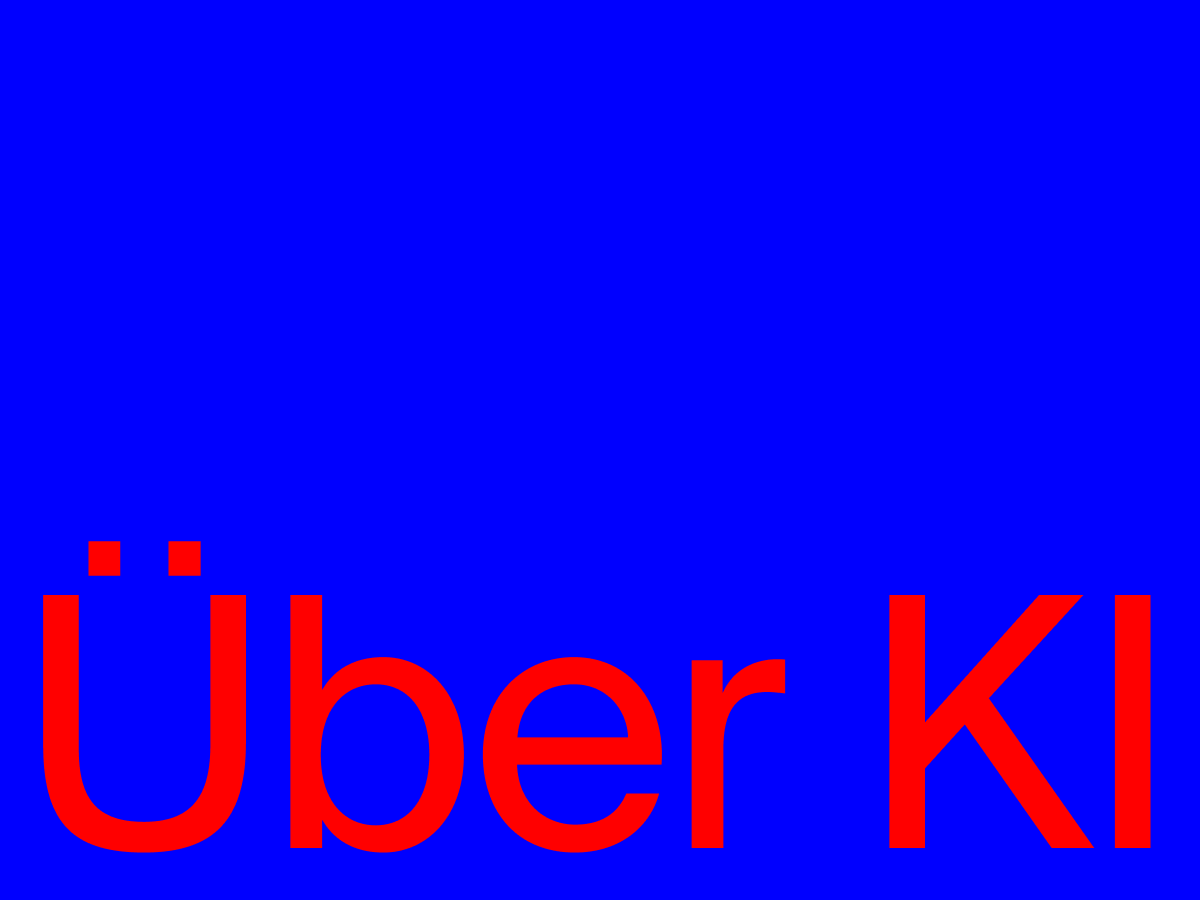 Gedanken über Künstliche Intelligenz
Gedanken über Künstliche Intelligenz
Photo: Vyběr Socky Was ein Ritt! Ich sitze im Zimmer eines Prager Luxushotels und packe wieder einmal diesen Koffer, aus […]
